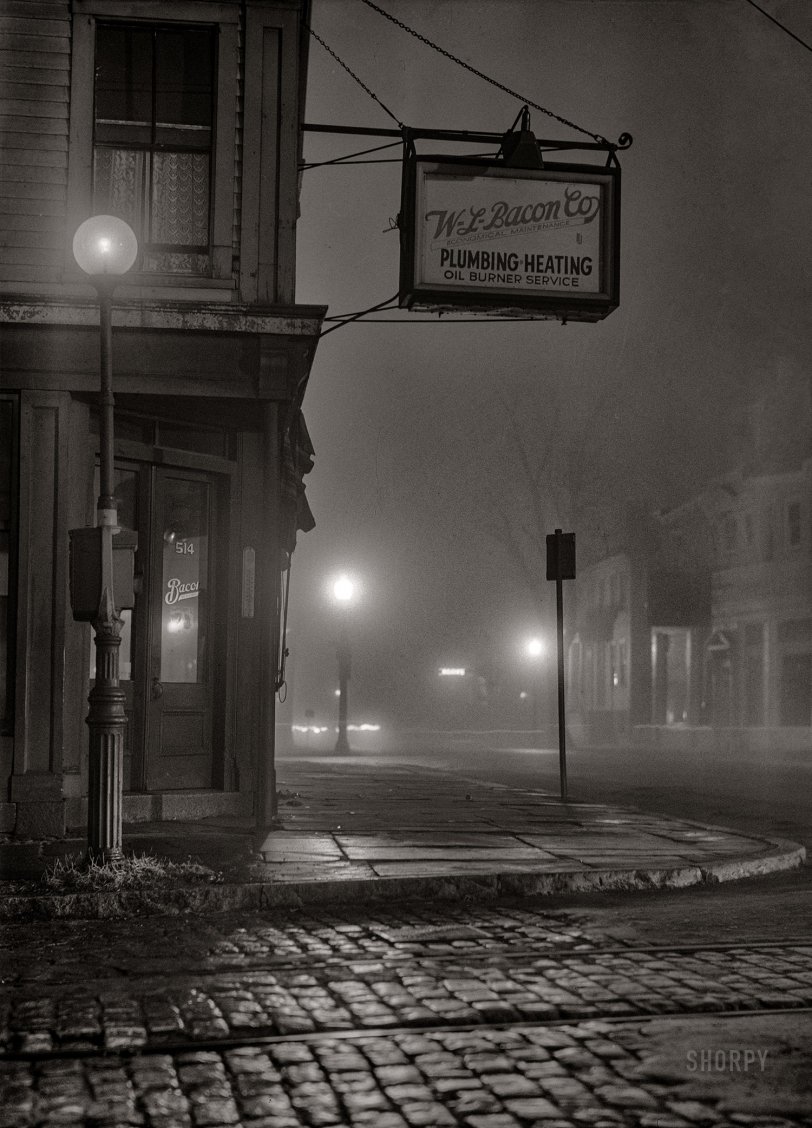
Tuesday, October 29, 2019
Nice Kitchen
Claude Monet's (and Mrs Monet's) kitchen in Giverny, France. Me and the Mrs have visited it twice.


Monday, October 28, 2019
Sunday, October 27, 2019
The Changing
There has been substantial change in the political positions of those in our two major parties over the last quarter century. Since 1994 the Pew Research Center has been asking the same set of 10 questions to the electorate (will update the post once I relocate the questions - FOUND IT! See end of post) and measuring that change. Below are the results:
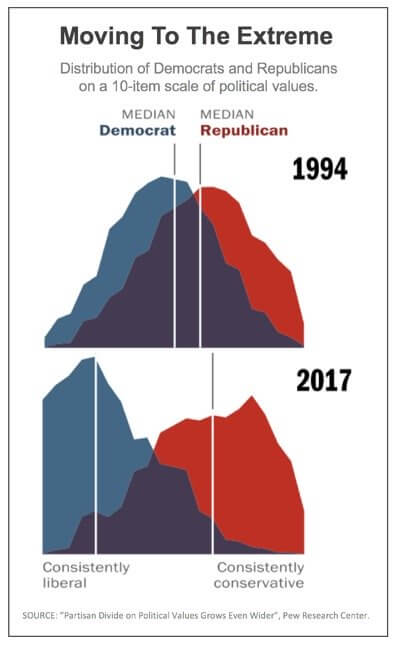 Notice what has happened? The Republican electorate has move right but the Democrat electorate has moved a lot to the left. Where there used to be considerable overlap in the middle is now substantially diminished.
Notice what has happened? The Republican electorate has move right but the Democrat electorate has moved a lot to the left. Where there used to be considerable overlap in the middle is now substantially diminished.
The move to the Left is so dramatic that on a personal note, I'm so old I was a Liberal back when we believed in free speech, freedom of conscience, equal protection and due process under the law. I still do.
If you look at the charts over time you will see the biggest shift of the Democrats to the left occurred during Pew's 2012 survey (I'm searching for the time lapse charts I've seen and will add to the post when I find them).
This coincides with my own observation that it was in 2011-12 the Obama Administration decided to "unleash the crazy" building within the Democratic electorate. It was during this period that same-sex marriage was transformed from an issue that could be discussed to one where opposition branded one a bigot and hater worthy of losing your job (soon to be followed by banishing any discussions of whether boys should be allowed in girls' bathrooms). It was when bureaucrats in Obama's Department of Education hyped issues of sexual assault on college campuses and issued their guidance depriving Americans of due process. It was when the Obama administration decided, with some success, to convince apolitical young single women that Republicans would ban all contraception if elected in 2012.
It was when Obama, concerned he might lose the 2012 election, set out to convince America that race relations were worsening, treating every voice who opposed Democratic policies as racist (also enabling Democrats to avoid discussions of substance), hyping the Trayvon Martin case with a deluge of falsehoods (a tactic since repeated with Michael Brown, Freddie Gray, and Omar Mateen), using Al Sharpton, who made his bones as a race man and Jew-baiter, as their go-to guy on civil rights, when Joe Biden was telling black audiences that Mitt Romney was "going to put y'all back in chains", and when the poisonous doctrine of intersectionality entered the discussion.
The strategy allowed Obama to fully embrace the bizarre theories of the academy, which had been slowly cooking at colleges and universities over the prior three decades (and which I mistakenly dismissed as so crazy, no one not on a college campus could ever take seriously) and which can be seen in his use of rhetorical tropes used by progressive academics.
After that the floodgates opened with the Democratic dominated news media, academia, and in tech. Look at this chart on the explosion in the use of the term "white privilege" since then. For more examples go here.
*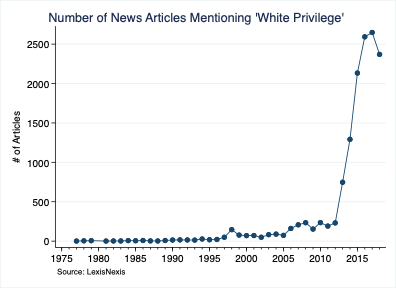

 Notice what has happened? The Republican electorate has move right but the Democrat electorate has moved a lot to the left. Where there used to be considerable overlap in the middle is now substantially diminished.
Notice what has happened? The Republican electorate has move right but the Democrat electorate has moved a lot to the left. Where there used to be considerable overlap in the middle is now substantially diminished.The move to the Left is so dramatic that on a personal note, I'm so old I was a Liberal back when we believed in free speech, freedom of conscience, equal protection and due process under the law. I still do.
If you look at the charts over time you will see the biggest shift of the Democrats to the left occurred during Pew's 2012 survey (I'm searching for the time lapse charts I've seen and will add to the post when I find them).
This coincides with my own observation that it was in 2011-12 the Obama Administration decided to "unleash the crazy" building within the Democratic electorate. It was during this period that same-sex marriage was transformed from an issue that could be discussed to one where opposition branded one a bigot and hater worthy of losing your job (soon to be followed by banishing any discussions of whether boys should be allowed in girls' bathrooms). It was when bureaucrats in Obama's Department of Education hyped issues of sexual assault on college campuses and issued their guidance depriving Americans of due process. It was when the Obama administration decided, with some success, to convince apolitical young single women that Republicans would ban all contraception if elected in 2012.
It was when Obama, concerned he might lose the 2012 election, set out to convince America that race relations were worsening, treating every voice who opposed Democratic policies as racist (also enabling Democrats to avoid discussions of substance), hyping the Trayvon Martin case with a deluge of falsehoods (a tactic since repeated with Michael Brown, Freddie Gray, and Omar Mateen), using Al Sharpton, who made his bones as a race man and Jew-baiter, as their go-to guy on civil rights, when Joe Biden was telling black audiences that Mitt Romney was "going to put y'all back in chains", and when the poisonous doctrine of intersectionality entered the discussion.
The strategy allowed Obama to fully embrace the bizarre theories of the academy, which had been slowly cooking at colleges and universities over the prior three decades (and which I mistakenly dismissed as so crazy, no one not on a college campus could ever take seriously) and which can be seen in his use of rhetorical tropes used by progressive academics.
After that the floodgates opened with the Democratic dominated news media, academia, and in tech. Look at this chart on the explosion in the use of the term "white privilege" since then. For more examples go here.
*


Tuesday, October 22, 2019
The Citizen


My favorite figure in American history between the Founding generation and the Civil War is the Sam Houston, governor of two states, congressman from one state and senator from another, President of the Republic of Texas, hero of the Texas Revolution, slaveholder who opposed secession, defender of Indian rights (for more read Sam Houston: The Raven).
Yesterday was the 190th anniversary of the date on which the Cherokee Nation granted citizenship to Sam in the document pictured above. Resigning as governor of Tennessee after his new wife left him, Houston went to join his beloved Cherokees in Arkansas, telling his friend David Crockett he was going to join the tribe in exile. He was to live there for three years, acquiring an Indian wife in the process, before heading to Texas. During this period he also visited Washington DC to represent Indian interests, meeting with his mentor President Andrew Jackson while there.
It was the second time in his life he'd lived with the Cherokees. As a teenager in Tennessee he'd run away from home and lived with the tribe for three years, learning their language.
Throughout his life, Houston was to feel an affinity for his Indian friends in many tribes and his advocacy on their behalf often caused him political problems, particularly in Texas.
During the 1854 Senate debate over the Kansas-Nebraska Bill during which he was the only southern senator to oppose the bill, Houston responded to remarks from an Indiana senator regarding Indians:
The honorable Senator from Indiana says in substance that God Almighty has condemned [the Indians], and made them an inferior race, that there is no use in doing anything for them. . . Sir, it is idle to tell me that. We have Indians on our western borders, whose civilization is not inferior to our own . . . The Indian has a sense of justice, truth and honor that should find a responsive chord in every heart. If the Indians on the frontier are barbarous . . . who are we to blame for it? They are robbed of the means of sustenance; and with hundreds and thousands of them starving on the frontier, hunger may prompt to such acts as prevent their perishing . . .The grant of citizenship document above reads:
We should be careful if it were with a power able to war with us; and it argues a degree of infinite meanness and indescribable degradation on our part to act differently with the Indians, who confide in our honor and justice, and who call the President their Great Father, and confide in him.
____ [?] an order has been published by the agent of
the cherokee Nation requiring all white men who re-
side in the Nation without the consent of the chiefs
of the Said Nation to comply with certain rules
and regulations set forth in Said order. Now be it
Known by them present, that Genl Samuel Houston,
late of the State of Tennessee, has been residing in
the Nation for Some time past, and has manifested
a disposition to remain with us. In consideration
of his former acquaintance with and Services rend-
dered to the Indians, and his present disposition,
to improve their condition and benefit their cir-
cumstances, and our confidence in his integrity, and
talents, if he Should remain among us; We do as
a committee appointed by order of the principal
chief John Jolly; Solemnly, firmly, and irreconcil- [?]
ably Grant to him for ever all the rights, privileges
and numunities [immunities] of a citizen of the cherokee Nation
and do as fully impower [sic] him with all rights and
liberties as tho he was a native cherokee, w[hile]
at the Same time the Said Houston be [?]
required to yield obedience to [text missing]
-tations made for the Government of the Native city-
zens [sic] of the cherokee Nation.
In witness whereof, we have this day, Set our
hands this 21st day of October 1829[.]
Cherokee Nation Walter Webber [his mark] President comtee
Illinois Aaron Price vice
Jno] Brown Clk Approved by John [his mark] Jolly principal Chief
national comtee
Illinois Aaron Price vice
Jno] Brown Clk Approved by John [his mark] Jolly principal Chief
national comtee
Monday, October 21, 2019
Sunday, October 20, 2019
Get Moving
Enough grousing about politics and time slipping away. We need something upbeat.
The first THC post more than seven years ago was I Need More Love from Robert Randolph & The Family Band. Time to revisit it. Get up and get moving.
The first THC post more than seven years ago was I Need More Love from Robert Randolph & The Family Band. Time to revisit it. Get up and get moving.
Saturday, October 19, 2019
His Own Worst Enemy
News items:
While much of what Trump has been accused of is false (see for instance my posts on the Russia Collusion Scandal), his own lack of discipline, his ignorance, and his constant need to brag have made things much worse for him, because they make more believable even the most outlandish accusations against him.
Take Russia, for example. His awful remarks during the campaign about Putin and Russia including morally equating the heinous actions of that country with ours made it more believable there was something illegitimate about his Russian connections. If he had merely more soberly expressed the view of the importance of improving relations from a geostrategic perspective it would still have been debatable but within the realm of discussion, particularly since that was Barack Obama's position during the 2008 and 2012 campaigns.
His repulsive behavior regarding regarding Russia continued after the election. Bragging to Russian government officials visiting the White House the day after firing James Comey that he did so on behalf of Russia was just stupid. And when before, during, and after the Helsinki conference he acted like a star struck teenage girl with Putin it just continued to reinforce the credibility of the accusations against him. To cap it all, the day after Trump was cleared by the Mueller Report he publicly gloated about it while on the phone with Putin! All of which has helped obscure an unprecedented effort by the Democrats in and out of government and their media allies in their own collaboration with Russia, their interference in the 2016 campaign, and their continuing efforts to frame President Trump after his inauguration.
The latest kerfuffle over the Ukraine is also a self-generated disaster. Getting Rudy Guiliani involved in anything at this point in his career shows poor judgment as does engaging in the phone call with the newly elected president of the Ukraine.
The actions referenced at the top, are of the same ilk. He should never have suggested use of his resort for the G-7 meeting and it shows once again Trump's inability to separate his own personal interests from those of the office.
And the nature of his attack on Mattis is idiotic and typical Trumpian hyperbole. It also reinforces the image (a correct one in my opinion) that he's a terrible guy to work for. Irrational, prone to outbursts, not willing to read anything, and a guy who will turn on his subordinates rather than take any part of the blame for the things that go wrong. He is not a stand up guy.
On many issues Trump is more in tune with the American people than the Democratic Party. On immigration for example, Americans believe in poll after poll that we need better border security and that current immigration policy needs to be reformed in the direction of being more selective. In contrast the Democrats have effectively become an open borders party, making it clear through their support for sanctuary cities that they favor protecting violent illegal aliens and not protecting law-abiding Americans, including legal immigrants! And the old mainstream GOP favoring of more immigration in line with the desires of corporate America has also been rejected.
The problem is that on this and many other such issues, Trump's extreme and overstated rhetoric alienates or embarrasses many who would otherwise be inclined to support him though, at the same time, his willingness to verbally take on things that terrified other Republicans is an asset. Combined with his abject ignorance of governmental processes this leaves him better at identifying areas of national policy that should be changed than he is at actually accomplishing any such changes.
In a post this summer I quoted Holman Jenkins of the Wall St Journal:
While I think Jenkins correct it is also true that Trump takes down his supporters just as much as he takes down his opponents. We are all sinking. The difference between progressives and the rest of us is they think this process started in 2016 while we know our descent into Bizarro World began in 2008 and there are no signs we are emerging.*
It is a terrible time in American politics, the worst in my lifetime. The politically inept, intellectually and ethically bankrupt GOP that Trump destroyed deserved its fate. Meanwhile, 21st century Democrats embrace intolerance and division, seemingly intent on making the United States the new Yugoslavia. Maybe we deserve Trump (though for a contra view see this). As Henry Kissinger noted in 2018:
* Before you say "what about George W Bush?", let me explain - his was a failed Presidency but in the normal historical range of what we consider failed presidencies. As for Barack Obama just consider for a moment that a guy who claimed to have found Jesus through the preaching of a race-baiting anti-semite in whose church he sat for his entire life was nominated by a major party and elected president. Now there's something I never thought would happen! Trump is the second consecutive strange man we've elected president.
- Next G-7 meeting will be at Trump's Doral Resort in Florida
- Trump calls James Mattis, his former Secretary of Defense, the "world's most overrated general" after Mattis disagrees with him on Syria policy. Mattis responds, “I earned my spurs on the battlefield and Donald Trump earned his spurs in a letter from a doctor.”
While much of what Trump has been accused of is false (see for instance my posts on the Russia Collusion Scandal), his own lack of discipline, his ignorance, and his constant need to brag have made things much worse for him, because they make more believable even the most outlandish accusations against him.
Take Russia, for example. His awful remarks during the campaign about Putin and Russia including morally equating the heinous actions of that country with ours made it more believable there was something illegitimate about his Russian connections. If he had merely more soberly expressed the view of the importance of improving relations from a geostrategic perspective it would still have been debatable but within the realm of discussion, particularly since that was Barack Obama's position during the 2008 and 2012 campaigns.
His repulsive behavior regarding regarding Russia continued after the election. Bragging to Russian government officials visiting the White House the day after firing James Comey that he did so on behalf of Russia was just stupid. And when before, during, and after the Helsinki conference he acted like a star struck teenage girl with Putin it just continued to reinforce the credibility of the accusations against him. To cap it all, the day after Trump was cleared by the Mueller Report he publicly gloated about it while on the phone with Putin! All of which has helped obscure an unprecedented effort by the Democrats in and out of government and their media allies in their own collaboration with Russia, their interference in the 2016 campaign, and their continuing efforts to frame President Trump after his inauguration.
The latest kerfuffle over the Ukraine is also a self-generated disaster. Getting Rudy Guiliani involved in anything at this point in his career shows poor judgment as does engaging in the phone call with the newly elected president of the Ukraine.
The actions referenced at the top, are of the same ilk. He should never have suggested use of his resort for the G-7 meeting and it shows once again Trump's inability to separate his own personal interests from those of the office.
And the nature of his attack on Mattis is idiotic and typical Trumpian hyperbole. It also reinforces the image (a correct one in my opinion) that he's a terrible guy to work for. Irrational, prone to outbursts, not willing to read anything, and a guy who will turn on his subordinates rather than take any part of the blame for the things that go wrong. He is not a stand up guy.
On many issues Trump is more in tune with the American people than the Democratic Party. On immigration for example, Americans believe in poll after poll that we need better border security and that current immigration policy needs to be reformed in the direction of being more selective. In contrast the Democrats have effectively become an open borders party, making it clear through their support for sanctuary cities that they favor protecting violent illegal aliens and not protecting law-abiding Americans, including legal immigrants! And the old mainstream GOP favoring of more immigration in line with the desires of corporate America has also been rejected.
The problem is that on this and many other such issues, Trump's extreme and overstated rhetoric alienates or embarrasses many who would otherwise be inclined to support him though, at the same time, his willingness to verbally take on things that terrified other Republicans is an asset. Combined with his abject ignorance of governmental processes this leaves him better at identifying areas of national policy that should be changed than he is at actually accomplishing any such changes.
In a post this summer I quoted Holman Jenkins of the Wall St Journal:
Mr Trump is said to upset the norms of our political life, but how exactly? By lying? By engaging in demagoguery? By making absurd claims? His real trick has been to be a one-man satire of our politics. And so far he has yet to find an opponent or critic - whether Mr Biden, or Hillary Clinton or Mitt Romney - who doesn't prove his point.I'll add that Trump's appointed many 2nd rate people and many of his closest confidants seem 3rd rate at best. But looking back it's remarkable how poorly many of our reputed "first rate" government professionals have done in the 21st century. Perhaps Trump has demonstrated there isn't such a big difference between the "top people" and the rest of us; it turns out none of us know what we are doing.
To show what a liar he is, his enemies entangle themselves in lies. Democrats have turned themselves into a party of Adam Schiffs, who, whatever his previous virtues, now is wholly defined by his promotion of the collusion canard. It's an amazing psychological feat to squander their advantage over Mr Trump in this way.
Ditto the media. In their eagerness to traffic in falsehoods about Mr Trump, his media critics lend him strength. We face the weird prospect now of a world-class scandal involving the FBI and the intelligence community being aired even while much of the press is committed to being part of the coverup.
While I think Jenkins correct it is also true that Trump takes down his supporters just as much as he takes down his opponents. We are all sinking. The difference between progressives and the rest of us is they think this process started in 2016 while we know our descent into Bizarro World began in 2008 and there are no signs we are emerging.*
It is a terrible time in American politics, the worst in my lifetime. The politically inept, intellectually and ethically bankrupt GOP that Trump destroyed deserved its fate. Meanwhile, 21st century Democrats embrace intolerance and division, seemingly intent on making the United States the new Yugoslavia. Maybe we deserve Trump (though for a contra view see this). As Henry Kissinger noted in 2018:
"I think Trump may be one of those figures in history who appears from time to time to mark the end of an era and to force it to give up its old pretenses. It doesn't necessarily mean that he knows this, or that he is considering any great alternative. It could just be an accident."
* Before you say "what about George W Bush?", let me explain - his was a failed Presidency but in the normal historical range of what we consider failed presidencies. As for Barack Obama just consider for a moment that a guy who claimed to have found Jesus through the preaching of a race-baiting anti-semite in whose church he sat for his entire life was nominated by a major party and elected president. Now there's something I never thought would happen! Trump is the second consecutive strange man we've elected president.
Friday, October 18, 2019
Use Your Time
From The Dark Side Of The Moon, Pink Floyd's 1973 album which was on the Billboard Top 100 Album chart for 741 weeks between its release and 1988 and has sold 45 million copies worldwide to date.
Unique intro, strong lyrics and featuring David Gilmour, a master of the slow guitar solo (I particularly like the passage beginning at 4:09).
Unique intro, strong lyrics and featuring David Gilmour, a master of the slow guitar solo (I particularly like the passage beginning at 4:09).
Tired of lying in the sunshine staying home to watch the rain.
You are young and life is long and there is time to kill today.
And then one day you find ten years have got behind you.
No one told you when to run, you missed the starting gun.
Every year is getting shorter never seem to find the time.
Plans that either come to naught or half a page of scribbled lines
Hanging on in quiet desperation is the English way
The time is gone, the song is over,
Thought I'd something more to say.
Thursday, October 17, 2019
The Greediest Americans
It is amazing how many of the intelligentsia call it ‘greed’ to want to keep what you have earned, but not greed to want to take away what somebody else has earned, and let politicians use it to buy votes. – Thomas SowellBernie Sanders and Elizabeth Warren are the greediest people in American history. They promise to take trillions of dollars they did not earn from other people in order to give it to others in return for which the promised recipients will give them political power. And since both believe in a political creed in which everything one does is political and in which the government has untrammeled authority it will be unprecedented power over the people of the United States. In their world, individual liberty is conditional upon its conformance to their personal desires. I can think of nothing more greedy.
Wednesday, October 16, 2019
Milliken's Bend
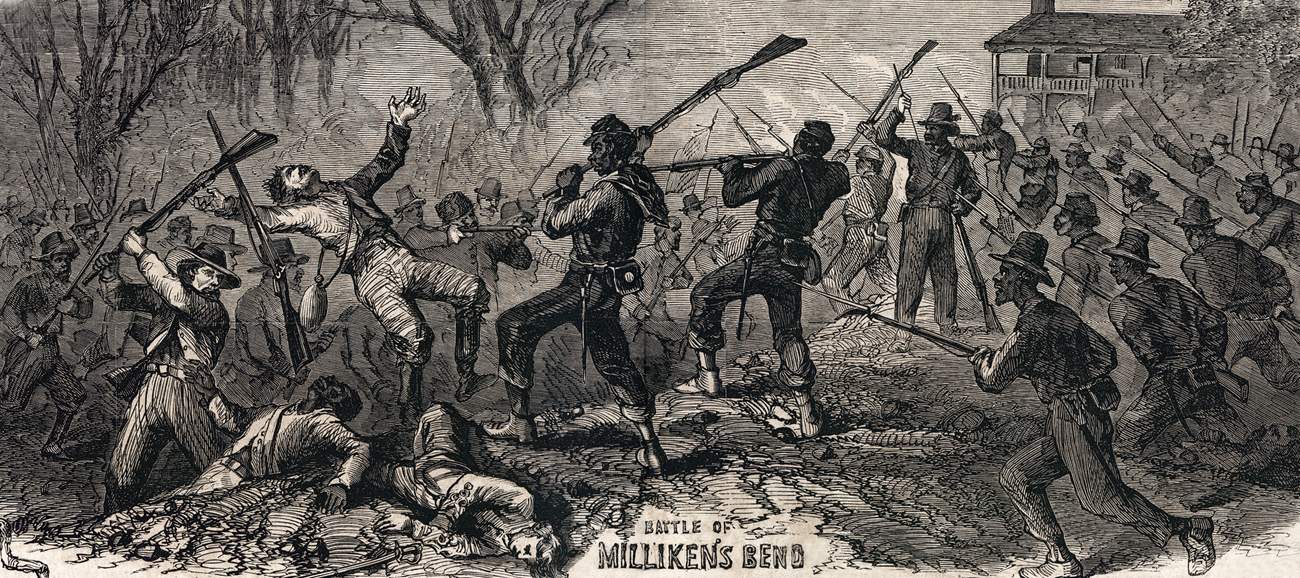
In June and July of 1863, three battles marked the first significant actions of the United States Colored Troops; Port Hudson (May 27), Fort (or Battery) Wagner (July 18), and Milliken's Bend (June 7). The latter was very different in its circumstances from the others. Port Hudson and Wagner both involved free blacks, free born Louisiana Creoles in the case of Hudson, and mostly New England free blacks in the case of the 54th Massachusetts assault on Wagner (an action depicted in the fine movie Glory). In contrast, the black soldiers at Milliken's Bend had been slaves just weeks before. Further, at Hudson and Wagner most of the Union soldiers involved in the battle were white, while at Milliken's Bend about 90% of the Federals engaged were black.
Last night our local Civil War Roundtable, for which I serve as program chair, had the pleasure of hearing a presentation by Linda Barnickel, author of Milliken's Bend: A Civil War Battle in History and Memory, the first book-length treatment of the battle and one I highly recommend.
The battle took place during the last month of U.S. Grant's seven month effort to capture the citadel of Vicksburg, the last crucial strategic outpost held by the Confederacy on the Mississippi River. Milliken's Bend lies about 15 miles north of Vicksburg on the opposite (west) side of the river and is within the northernmost parishes of Louisiana along the great river. The slave population of these parishes amounted to from 80% to more than 90% of the total population and as the Union Army advanced it caused panic among plantation owners and a recruitment opportunity for the Federals in light of policy changes that allowed for the enlistment of what were called the United States Colored Troops.

Barnickel gives a good accounting of the battle itself, which was little known to most Civil War buffs like Barnickel (and myself) until in 1992 she stumbled across a reference to a Union officer "murdered" and decided to pursue the story. As an archivist with the Nashville Public Library she knew how to do research but with having a full-time job it took her 20 years to complete the book which was published in 2013 to rave reviews by the Civil War press and historians.
In the context of the great battles of the war, Milliken's Bluff was a small affair with only about 1,500 soldiers involved on each side but casualties were significant. About 12% of the Confederate force was killed or wounded and a third of the Union force (including an understrength white regiment from Iowa) killed, wounded, or captured. One of the black regiments suffered 68% losses, including 23% killed, more dead than the 1st Minnesota in its famed suicidal charge at Gettysburg. Though driven back to the river bank, the Union troops held on and eventually the attacking Confederates withdrew. And it led to more Union officers and soldiers admitting (sometimes grudgingly) that blacks could be effective soldiers.
What I enjoyed most about the book were the parts before and after the battle. We learn about the Confederate attacking force consisting of four regiments from Texas and the background of turmoil in the regions of that state from where they came. We learn about plantation life and the abrupt and confusing changes confronting the former slaves when the Union Army entered the area. We learn about how the plantation owners reacted to the uncertain fortunes of war and their constant fear of a slave uprising.
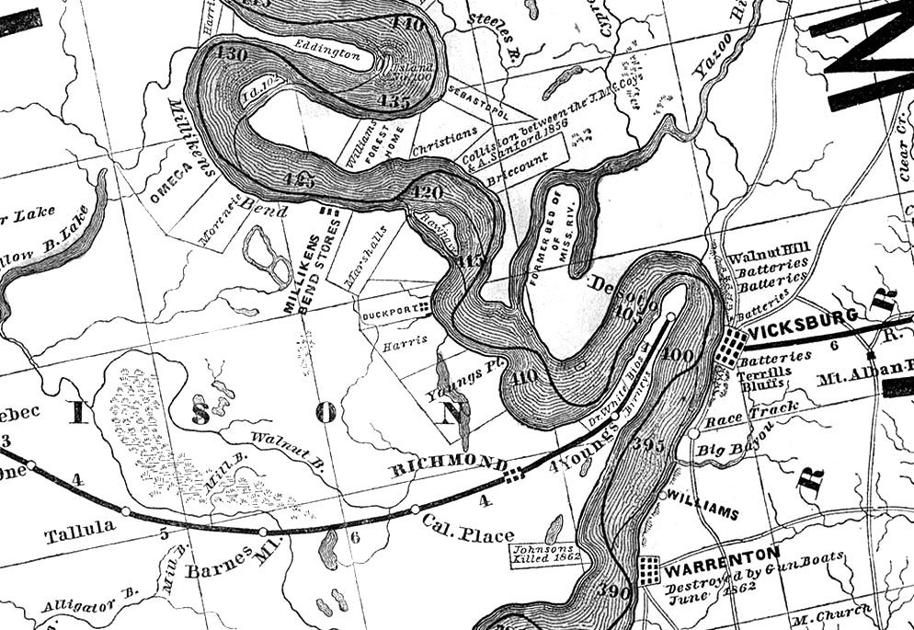
After the battle Barnickel investigates the confused over Confederate policies towards captured black soldiers and their white offices along with the rumors of Rebel execution of captured white officers from the black regiments, rumors proved true in at least two instances, and which contributed to the decision of the Lincoln Administration to suspend prisoner exchanges with the South. And she recounts how the battle was mostly not remembered for a century (aided by the immersion of the battlefield under the shifting waters of the Mississippi and the lack of acknowledgement of the role of black soldiers in the war), something that has changed in recent decades.
Most of all, I appreciated the lack of presentism and lecturing in the book. The author presented her findings and goes to great effort to try to understand everyone as they existed and thought in the 1860s, not in the 21st century. She lets the reader draw their own conclusions.
Tuesday, October 15, 2019
"I've Had A Great Life"
Actor Robert Forster died last Friday at the age of 78. The recent interviews below show an upbeat man of grace and gratitude. After some initial success in movies and TV during the late 1960s and early 70s, Forster fell into two decades of obscurity, taking any roles he could find to get by.
His career was resurrected in 1997 when Quentin Tarantino cast him as bail bondsman Max Cherry in Jackie Brown, based on Elmore Leonard's book Rum Punch, a role which saw Forster receive an Oscar nomination for Best Supporting Actor. For the past two decades Forster has worked steadily and achieved acclaim in numerous roles. Those of us immersed in the Breaking Bad universe know him in the role of Ed The Disappearer in BB which he reprised for its sequel, El Camino, which opened the day Forster died.
His career was resurrected in 1997 when Quentin Tarantino cast him as bail bondsman Max Cherry in Jackie Brown, based on Elmore Leonard's book Rum Punch, a role which saw Forster receive an Oscar nomination for Best Supporting Actor. For the past two decades Forster has worked steadily and achieved acclaim in numerous roles. Those of us immersed in the Breaking Bad universe know him in the role of Ed The Disappearer in BB which he reprised for its sequel, El Camino, which opened the day Forster died.
Monday, October 14, 2019
A Study In Contrasts
Reading Andrew McCarthy’s Ball of Collusion, which is simply the finest book length treatment on the Russia Collusion Hoax perpetrated by the Democrats and their embedded allies in the intelligence agencies, FBI, and Department of Justice, reminded me of the striking contrast in how Democratic and Republican administrations respond to investigations.
Carter Page, one of the supposed starting points for the Russia investigation and who was used as the vehicle to obtain a FISA Warrant enabling the anti-Trump crowd to gain broad access to communications of both the campaign and later the new administration, completely cooperated with DOJ and later the Mueller probe. He never retained a lawyer and made himself freely available for questioning. I thought he was an idiot at the time. Nonetheless, he was never indicted, nor even mentioned as an unindicted co-conspirator in any other case, and despite the colorful and distorted language used about him in the Mueller report, it found no evidence of collusion. What does that tell you?
This reminded me of a little known fact - little known since it served no purposed for the NY Times, WaPo, or CNN to let its readers and viewers know - the Trump administration’s cooperation with the Mueller probe. President Trump waived executive privilege and released millions of documents and allowed administration officials, including his own White House Counsel, to be interviewed by Mueller and his team of Democratic party tools. And once again, the Mueller report found no collusion.
In a similar mode back in 2004, the Bush Administration ordered its officials to fully cooperate in James Comey’s prosecutorial vendetta against Dick Cheney (for more on this read Why Scooter Libby Was Pardoned Now), a terrible tactical mistake by the President.
We can see a clear contrast with the approach of the Obama Administration during which Eric Holder, who saw no problem in describing himself as the President’s “wingman” and his successor Loretta Lynch, did not hesitate to thwart investigators. Holder was even willing to become the first Attorney General to be cited for contempt of Congress for his refusal to turn over documents related to Fast & Furious (the program under which the government allowed guns to be purchased in the United States and then transferred to Mexican cartels for use in crimes in that country and along the American border - at least one American border patrol officer and hundreds of Mexicans were killed used these weapons). Strangely, the government did not directly follow these transfers in order to arrest violators and it never notified the Mexican government of the program; the revelation of the program caused outrage in Mexico (confirmed by my friends there) though you would never know it in the U.S. since the press went to great lengths not to report on it. For those who read the NY Times, the story was completely ignored by the paper of record, until AG Holder decided to call in one of the paper’s DC stenographers to take down his accusation that the accusations of misdoing regarding Fast & Furious were being made by racists, which the Times duly noted.
Note: For anyone reading or watching the progressive media to the extent Fast & Furious was not totally ignored, you will have been fed the idea that the Obama administration program was the same as one conducted by the Bush Administration. That’s true, except for the critical facts that under the Bush program the purchased weapons were actively tracked and the Mexican government was informed by the administration of the program and agreed to it!
The pattern of Fast & Furious was repeated time and time regarding Congressional requests for documents regarding alleged administration scandals. We saw the same pattern of delay and obstruction when Congress attempted to investigate the IRS targeting of conservative organizations.
This obstruction was not limited to Congress. In 2014, about 2/3 of the government’s Inspector Generals - independent officials appointed to oversee the compliance of federal agencies with the law - wrote an open letter to Congress protesting the Obama Administration’s active obstruction, via the Department of Justice, with its investigations. Can you imagine the uproar if this happened while Trump was president. Instead, the letter drew little (a one-day story in the WaPo) to no (in the NY Times and CNN) coverage in the progressive media.
And, most dramatically, was Barack Obama’s announcement on national TV (while the investigation was ongoing!) that Hillary Clinton had committed no crime regarding her handling of classified emails while Secretary of State and the failure his Justice Department “wingman” to appoint of a Special Counsel after the President had clearly compromised DOJ’s supposed impartiality regarding its ongoing investigation. After all, they had to clear Hillary in order for her to win the presidential election.
Carter Page, one of the supposed starting points for the Russia investigation and who was used as the vehicle to obtain a FISA Warrant enabling the anti-Trump crowd to gain broad access to communications of both the campaign and later the new administration, completely cooperated with DOJ and later the Mueller probe. He never retained a lawyer and made himself freely available for questioning. I thought he was an idiot at the time. Nonetheless, he was never indicted, nor even mentioned as an unindicted co-conspirator in any other case, and despite the colorful and distorted language used about him in the Mueller report, it found no evidence of collusion. What does that tell you?
This reminded me of a little known fact - little known since it served no purposed for the NY Times, WaPo, or CNN to let its readers and viewers know - the Trump administration’s cooperation with the Mueller probe. President Trump waived executive privilege and released millions of documents and allowed administration officials, including his own White House Counsel, to be interviewed by Mueller and his team of Democratic party tools. And once again, the Mueller report found no collusion.
In a similar mode back in 2004, the Bush Administration ordered its officials to fully cooperate in James Comey’s prosecutorial vendetta against Dick Cheney (for more on this read Why Scooter Libby Was Pardoned Now), a terrible tactical mistake by the President.
We can see a clear contrast with the approach of the Obama Administration during which Eric Holder, who saw no problem in describing himself as the President’s “wingman” and his successor Loretta Lynch, did not hesitate to thwart investigators. Holder was even willing to become the first Attorney General to be cited for contempt of Congress for his refusal to turn over documents related to Fast & Furious (the program under which the government allowed guns to be purchased in the United States and then transferred to Mexican cartels for use in crimes in that country and along the American border - at least one American border patrol officer and hundreds of Mexicans were killed used these weapons). Strangely, the government did not directly follow these transfers in order to arrest violators and it never notified the Mexican government of the program; the revelation of the program caused outrage in Mexico (confirmed by my friends there) though you would never know it in the U.S. since the press went to great lengths not to report on it. For those who read the NY Times, the story was completely ignored by the paper of record, until AG Holder decided to call in one of the paper’s DC stenographers to take down his accusation that the accusations of misdoing regarding Fast & Furious were being made by racists, which the Times duly noted.
Note: For anyone reading or watching the progressive media to the extent Fast & Furious was not totally ignored, you will have been fed the idea that the Obama administration program was the same as one conducted by the Bush Administration. That’s true, except for the critical facts that under the Bush program the purchased weapons were actively tracked and the Mexican government was informed by the administration of the program and agreed to it!
The pattern of Fast & Furious was repeated time and time regarding Congressional requests for documents regarding alleged administration scandals. We saw the same pattern of delay and obstruction when Congress attempted to investigate the IRS targeting of conservative organizations.
This obstruction was not limited to Congress. In 2014, about 2/3 of the government’s Inspector Generals - independent officials appointed to oversee the compliance of federal agencies with the law - wrote an open letter to Congress protesting the Obama Administration’s active obstruction, via the Department of Justice, with its investigations. Can you imagine the uproar if this happened while Trump was president. Instead, the letter drew little (a one-day story in the WaPo) to no (in the NY Times and CNN) coverage in the progressive media.
And, most dramatically, was Barack Obama’s announcement on national TV (while the investigation was ongoing!) that Hillary Clinton had committed no crime regarding her handling of classified emails while Secretary of State and the failure his Justice Department “wingman” to appoint of a Special Counsel after the President had clearly compromised DOJ’s supposed impartiality regarding its ongoing investigation. After all, they had to clear Hillary in order for her to win the presidential election.
Columbus Day
Celebrating today by getting lost while looking for spices in the kitchen.
- via Assistant Village Idiot
Saturday, October 12, 2019
Bird Comes To Boston
“If I had to choose a player to take a final shot to win a game I’d choose (Michael) Jordan, but if I could pick one to shoot to save my life I would pick Bird.”This is the 40th anniversary of Larry Bird's first game with the Boston Celtics.
- Pat Riley (Coach, LA Lakers & NY Knicks, President & Coach, Miami Heat)
I was there that night. Can't remember how we got the tickets but they were on the floor a few rows behind one of the baskets. Larry's arrival was much anticipated. When they announced him, doves were released and flew around the Garden. And, of course, he made some tough shots and startling passes that night. The Celtics who had been pathetic the year before won 60 games during the 1979-80 season. He was a joy to watch.
THC favorite athletes:
1. Willie Mays
2. Larry Bird
3. Big Papi
Watch Larry:
Thursday, October 3, 2019
It's All Right
Just lovely. A remastered version of Here Comes The Sun, released on the 50th anniversary of the Abbey Road album, the last recorded by The Beatles.
Wednesday, October 2, 2019
Warsaw Does Not Cry
Warsaw 1945

On this date 75 years ago the Warsaw Uprising of the Polish Home Army ended.
While the collaboration of Hitler's National Socialists and Stalin's Communists triggered the start of World War Two with their Non-Aggression Pact in August 1939 and joint invasion of Poland the following month, Hitler's betrayal and attack upon the Soviet Union two years later has obscured one final act of regime collaboration in 1944.
By the summer of 1944, Poland had been occupied for almost five years. Most of Poland's 3.3 million Jews were dead and the series of extermination groups dedicated to that task, including Treblinka and Sobibor, had ceased operations and been demolished. Perhaps another 2 million Poles were also dead. In all, at least 5 million gone from a pre-war population of 30 million.
June 1944 is remembered in the West for the D-Day invasion in Normandy on June 6 but another event of momentous consequence took place on the Eastern Front that same month. Since November 1942, the Soviets had launched a series of offensives pushing the Germans back almost to pre-war borders in many areas except in the center of the front where the Nazis still held a bulge of territory in what is now Belarus, an area defended by Army Group Centre.
On June 23, 1944 the Red Army launched a titanic offensive catching the Germans unprepared and within a couple of weeks destroying most of the Wehrmacht forces. As Soviet armor and infantry raced towards the Vistula River and Warsaw, the Polish Home Army debated how to react.
The Home Army was the coordinator of Polish resistance, beginning its work shortly after Poland was occupied in 1939. It had between 25,000 and 50,000 people in Warsaw, willing to fight, but hampered by a lack of arms, and in a city in which about a quarter of the buildings were already destroyed from German bombing in September 1939 and in the fighting during the Warsaw Ghetto uprising in the spring of 1943, when the remaining Jews of the ghetto rose up against the Nazis.
One option was to wait for what seemed the imminent liberation of Warsaw by fast-advancing Soviet forces, the other to stage an uprising, evict the Germans, and greet the Soviets with the Polish capital liberated by its own people.
There was little chance of waiting for the Soviets. There was already great mistrust of the communists because of their brutality when they occupied eastern Poland from 1939 until 1941. That mistrust grew when, in September 1943, the retreating Germans announced they found the bodies of about 15,000 Polish officers in the Katyn Forest, claiming they'd been executed by the Soviets in 1940. The officers had surrendered to the Soviets in September 1939 and until spring of the following year relatives occasionally had news of them. After that, silence. While the Soviets claimed the Nazis murdered the officers, the Poles were convinced that Stalin was to blame. Fifty years later, in the wake of the fall of the Soviet Union, the documents recording the Politburo decision in March 1940 to conduct the executions were publicly released.
The Home Army also suspected that if it did not rise up and the Soviets occupied Warsaw without its help, they would be denounced by the communists as Nazi collaborators. The Poles felt they would be in a stronger position to determine their country's postwar fate if they liberated Warsaw.
On August 1, 1944 the Home Army rose up, seizing buildings and killing Germans. Caught off guard, the German garrison initially retreated and the Poles occupied a sizable portion of the city.
But Hitler and the Nazis would not sit back. Less than two weeks before Hitler survived an assassination and coup attempt which left him injured. He wanted revenge on all his enemies and he had always hated the Poles. Heinrich Himmler pointed out with perverse logic the opportunity presented by the revolt:
All through the rest of August and into September, the Germans very slowly advanced through the city.
Leading one company of the Home Army was Captain Witold Pilecki, whose life provides one of the finest examples in the 20th century of moral and physical courage, a man of whom, many years later, the Chief Rabbi of Poland was to write, "When God created the human being, God had in mind that we should all be like Captain Witold Pilecki, of blessed memory".
In his epic account of the uprising, Rising '44: The Battle for Warsaw, Norman Davies describes Pilecki's role in frustrating the initial German counterattack:
Warsaw Old Town during the Uprising

And what were the Soviets doing during the desperate struggle of the Home Army? Nothing. The Red Army halted its advance on the outskirts of Warsaw, claiming it had exhausted equipment and supplies in the rapid advance of the prior weeks. There was truth in this. Yet the Soviets also refused to provide any material aid to the Poles fighting on the other side of the Vistula. Why would they, when Hitler was doing Stalin's work, destroying the only organized anti-communist resistance on the ground in Poland?
Winston Churchill sought to help the Poles, bombarding Stalin with personal requests for Red Army assistance, to allow British and American planes to drop supplies over Warsaw and use Red Army air base to land and refuel. Stalin refused all such requests for much of the time and, to his shame, Franklin Roosevelt refused Churchill's requests to join him in the appeals to Stalin.
Nonetheless, Churchill ordered supply efforts from bases in England and Italy flown by British, Polish, and South African crews. Because the planes could not use Soviet airbases to refuel the number of missions and amount of supplies able to be transported was limited. Approximately 300 Allied airmen died in these missions.
After mid-September, when it became clear the Home Army revolt would fail, Stalin relented, approving some Soviet supply efforts and the use of air bases by Western aircraft.
At the same time, the Germans realized that while the situation of the Poles was hopeless they would keep on fighting, prolonging the street battles for weeks or even months, prompting the Nazis to do what they had never done before in Occupied Europe - negotiate with the Resistance, ultimately agreeing to treat any surrendered Home Army soldiers as Prisoners of War.
On October 2, the Home Army ceased fighting and thousands of its soldiers, including Pilecki, were sent to POW camps (the Germans kept their side of the bargain).
Including civilians, about 200,000 Poles died during the Uprising. The Germans, who incurred 11,000 dead and wounded, expelled all surviving civilians from Warsaw and began to systematically destroy what was left of the city. By the time the Soviets finally captured the city in January 1945, about 85% of prewar Warsaw was demolished.
The Soviet occupation of Poland was completed by February 1945. Behind the Red Army came Stalin's secret police who executed, imprisoned or sent to the Gulag the remnants of the Home Army and anyone else who might object to communist domination of the country. Witold Pilecki, who after release from the POW camp, made his way to join Polish forces in Italy, volunteered to return to Poland and organize resistance against the communists. He was arrested in 1947 and secretly executed shortly thereafter. Today he is recognized as a Polish national hero.

On this date 75 years ago the Warsaw Uprising of the Polish Home Army ended.
While the collaboration of Hitler's National Socialists and Stalin's Communists triggered the start of World War Two with their Non-Aggression Pact in August 1939 and joint invasion of Poland the following month, Hitler's betrayal and attack upon the Soviet Union two years later has obscured one final act of regime collaboration in 1944.
By the summer of 1944, Poland had been occupied for almost five years. Most of Poland's 3.3 million Jews were dead and the series of extermination groups dedicated to that task, including Treblinka and Sobibor, had ceased operations and been demolished. Perhaps another 2 million Poles were also dead. In all, at least 5 million gone from a pre-war population of 30 million.
June 1944 is remembered in the West for the D-Day invasion in Normandy on June 6 but another event of momentous consequence took place on the Eastern Front that same month. Since November 1942, the Soviets had launched a series of offensives pushing the Germans back almost to pre-war borders in many areas except in the center of the front where the Nazis still held a bulge of territory in what is now Belarus, an area defended by Army Group Centre.
On June 23, 1944 the Red Army launched a titanic offensive catching the Germans unprepared and within a couple of weeks destroying most of the Wehrmacht forces. As Soviet armor and infantry raced towards the Vistula River and Warsaw, the Polish Home Army debated how to react.
The Home Army was the coordinator of Polish resistance, beginning its work shortly after Poland was occupied in 1939. It had between 25,000 and 50,000 people in Warsaw, willing to fight, but hampered by a lack of arms, and in a city in which about a quarter of the buildings were already destroyed from German bombing in September 1939 and in the fighting during the Warsaw Ghetto uprising in the spring of 1943, when the remaining Jews of the ghetto rose up against the Nazis.
One option was to wait for what seemed the imminent liberation of Warsaw by fast-advancing Soviet forces, the other to stage an uprising, evict the Germans, and greet the Soviets with the Polish capital liberated by its own people.
There was little chance of waiting for the Soviets. There was already great mistrust of the communists because of their brutality when they occupied eastern Poland from 1939 until 1941. That mistrust grew when, in September 1943, the retreating Germans announced they found the bodies of about 15,000 Polish officers in the Katyn Forest, claiming they'd been executed by the Soviets in 1940. The officers had surrendered to the Soviets in September 1939 and until spring of the following year relatives occasionally had news of them. After that, silence. While the Soviets claimed the Nazis murdered the officers, the Poles were convinced that Stalin was to blame. Fifty years later, in the wake of the fall of the Soviet Union, the documents recording the Politburo decision in March 1940 to conduct the executions were publicly released.
The Home Army also suspected that if it did not rise up and the Soviets occupied Warsaw without its help, they would be denounced by the communists as Nazi collaborators. The Poles felt they would be in a stronger position to determine their country's postwar fate if they liberated Warsaw.
On August 1, 1944 the Home Army rose up, seizing buildings and killing Germans. Caught off guard, the German garrison initially retreated and the Poles occupied a sizable portion of the city.
But Hitler and the Nazis would not sit back. Less than two weeks before Hitler survived an assassination and coup attempt which left him injured. He wanted revenge on all his enemies and he had always hated the Poles. Heinrich Himmler pointed out with perverse logic the opportunity presented by the revolt:
My Führer, the timing is unfortunate, but from a historical perspective what the Poles are doing is a blessing. After five, six weeks we shall leave. But by then Warsaw, the capital, the head, the intelligence of this former 16–17 million Polish people will be extinguished, this Volk that has blocked our way to the east for seven hundred years and has stood in our way ever since the First Battle of Tannenberg [in 1410]. After this the Polish problem will no longer be a great historical problem for the children who come after us, nor indeed will it be for us.Ordering reinforcements to the city, the Germans reentered, initially killing everyone they found; men, women, and children. Tens of thousands died. The massacre strengthened the resistance because Poles felt they had no alternative but to fight. Eventually the Germans realized the strategy was a mistake stopped the deliberate mass killing of civilians, though many continued to die in the fighting and all Home Army soldiers were executed if captured.
All through the rest of August and into September, the Germans very slowly advanced through the city.
Leading one company of the Home Army was Captain Witold Pilecki, whose life provides one of the finest examples in the 20th century of moral and physical courage, a man of whom, many years later, the Chief Rabbi of Poland was to write, "When God created the human being, God had in mind that we should all be like Captain Witold Pilecki, of blessed memory".
In his epic account of the uprising, Rising '44: The Battle for Warsaw, Norman Davies describes Pilecki's role in frustrating the initial German counterattack:
. . . a company led by Capt. Roman [the name Pilecki was known by] repeatedly invested a strategic building which overlooked the traffic on the boulevard Roman . . . Almost every day during the first two weeks of the month, he captured, lost, and recaptured this building. Repeatedly driven out, he repeatedly returned and with deadly cunning repeatedly expelled the German defenders . . . so long as he threatened this one vital pressure point, the German command was constantly made to feel insecure. One is tempted to suggest that a single company could have won the Rising a fortnight's reprieve.For more on the life of this remarkable man read Volunteering For Auschwitz.
Warsaw Old Town during the Uprising

And what were the Soviets doing during the desperate struggle of the Home Army? Nothing. The Red Army halted its advance on the outskirts of Warsaw, claiming it had exhausted equipment and supplies in the rapid advance of the prior weeks. There was truth in this. Yet the Soviets also refused to provide any material aid to the Poles fighting on the other side of the Vistula. Why would they, when Hitler was doing Stalin's work, destroying the only organized anti-communist resistance on the ground in Poland?
Winston Churchill sought to help the Poles, bombarding Stalin with personal requests for Red Army assistance, to allow British and American planes to drop supplies over Warsaw and use Red Army air base to land and refuel. Stalin refused all such requests for much of the time and, to his shame, Franklin Roosevelt refused Churchill's requests to join him in the appeals to Stalin.
Nonetheless, Churchill ordered supply efforts from bases in England and Italy flown by British, Polish, and South African crews. Because the planes could not use Soviet airbases to refuel the number of missions and amount of supplies able to be transported was limited. Approximately 300 Allied airmen died in these missions.
After mid-September, when it became clear the Home Army revolt would fail, Stalin relented, approving some Soviet supply efforts and the use of air bases by Western aircraft.
At the same time, the Germans realized that while the situation of the Poles was hopeless they would keep on fighting, prolonging the street battles for weeks or even months, prompting the Nazis to do what they had never done before in Occupied Europe - negotiate with the Resistance, ultimately agreeing to treat any surrendered Home Army soldiers as Prisoners of War.
On October 2, the Home Army ceased fighting and thousands of its soldiers, including Pilecki, were sent to POW camps (the Germans kept their side of the bargain).
Including civilians, about 200,000 Poles died during the Uprising. The Germans, who incurred 11,000 dead and wounded, expelled all surviving civilians from Warsaw and began to systematically destroy what was left of the city. By the time the Soviets finally captured the city in January 1945, about 85% of prewar Warsaw was demolished.
The Soviet occupation of Poland was completed by February 1945. Behind the Red Army came Stalin's secret police who executed, imprisoned or sent to the Gulag the remnants of the Home Army and anyone else who might object to communist domination of the country. Witold Pilecki, who after release from the POW camp, made his way to join Polish forces in Italy, volunteered to return to Poland and organize resistance against the communists. He was arrested in 1947 and secretly executed shortly thereafter. Today he is recognized as a Polish national hero.
Tuesday, October 1, 2019
Cousins?
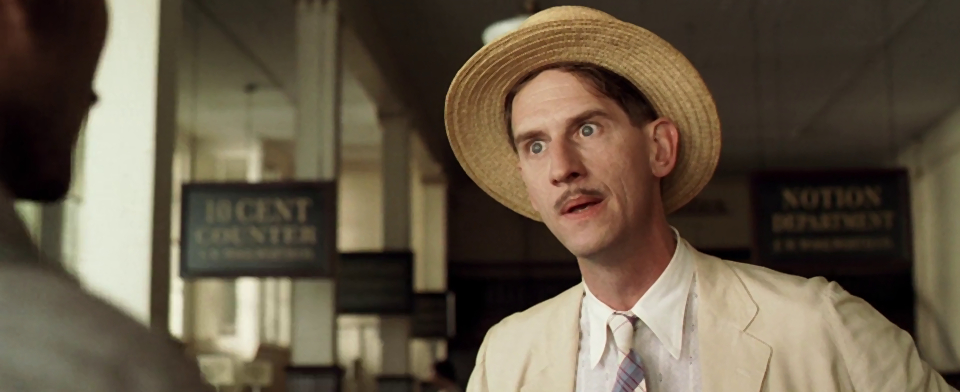
Subscribe to:
Posts (Atom)




